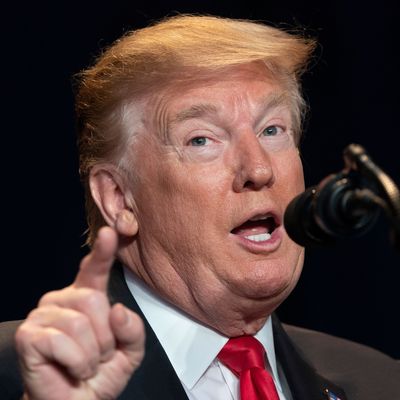
One of Donald Trump’s favorite riffs is a wish, cast as a warning, that his supporters inside and outside the state security services will unleash violence on his political opponents if they continue to oppose the administration. The specifics of the riff don’t vary much. Trump laments that his opponents are treating him unfairly, praises the toughness and strength of his supporters — a category that combines the police, military, and Bikers for Trump, which he apparently views as a Brownshirt-like militia — and a prediction that his supporters will at some point end their restraint.
He does it again in a new interview with Breitbart:
I actually think that the people on the right are tougher, but they don’t play it tougher. Okay? I can tell you I have the support of the police, the support of the military, the support of the Bikers for Trump – I have the tough people, but they don’t play it tough — until they go to a certain point, and then it would be very bad, very bad.
Early warnings that Trump could undermine the Constitution have not been borne out, which has produced a certain complacency about the issue. It is true that Trump is only an aspirational authoritarian, and to date has failed to bring his most illiberal dreams to life. He has used the government to punish independent media, prevailing upon the Post Office to raise rates on Amazon in retaliation for Jeff Bezos’s ownership of the Washington Post, and repeatedly told his staff to order the Justice Department to block a merger in order to punish CNN. So far, this has had little effect.
On the other hand, if Trump wins a second term — a prospect that, under current economic conditions, is close to a toss-up — his presidency will only be a quarter of the way through. Already his authoritarian rhetoric is so thoroughly normalized that it hardly even registers as news any more. Anybody whose political efforts involve helping Trump gain more power, rather than opposing that project, is playing Russian roulette with the Constitution.
Republicans have had some success in restraining Trump’s abuses — in large part by slow-walking his most blatantly illegal or authoritarian orders. But the GOP’s willingness to defy Trump has also eroded steadily over his presidency. Congress’s failure to block Trump’s use of emergency powers to build the border wall that Congress has declined to fund is an important marker in that deterioration.
Republicans used to define more modest exertions of executive power by President Obama as dangerous Caesarism. Republicans turned Obama’s rather casual vow to use his “pen and phone” to carry out executive authority into a Hitleresque claim of total power. Accordingly, when Trump claimed executive power to fund a project Congress refused to fund, at least some conservatives denounced his plans. North Carolina senator Thom Tillis wrote an op-ed calling for Congress to deny Trump’s authority.
“Conservatives rightfully cried foul when President Barack Obama used executive action to completely bypass Congress and unilaterally provide deferred action to undocumented adults who had knowingly violated the nation’s immigration laws. Some prominent Republicans went so far as to proclaim that Obama was acting more like an “emperor” or “king” than a president,” he wrote, “There is no intellectual honesty in now turning around and arguing that there’s an imaginary asterisk attached to executive overreach — that it’s acceptable for my party but not thy party.”
But then Trump started looking into supporting a primary challenger against Tillis. And lo and behold, Tillis abandoned the sacred principle. Republicans could have mustered a veto-proof majority to join with Democrats and block Trump, but failed. If Republicans are too frightened to defend what they themselves regard as a vital principle of the Constitution, what confidence should we have that they’ll stand in the way of Trump’s continued assaults on the Republic?






























